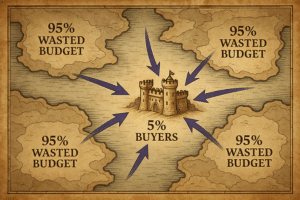How can Marketo Salesforce integration drive revenue?
Marketing and sales are too often separated within the same company. Yet their jobs are complementary
- Marketing generates leads and qualifies them,
- The latter “convert the trial” and bring in opportunities.
You are about to buy Marketo and you wonder if you should synchronize it with your CRM solution salesforce.
What are the benefits and constraints?
We’ll be talking mostly about B2B companies that are managing lengthy sales processes with Salesforce, the leading sales automation solution.
To synchronize or not to synchronize Marketo and Salesforce, that is the question!
And what a strange question, it would seem logical though! In fact … not so much in large groups.
In fact, it is quite common to meet a customer whose marketing team wants to start its Marketing Automation project quickly, while the IT department has a busy schedule and not necessarily time to add an interface.
Or maybe it’s a relatively autonomous subsidiary that wants to start on Marketo, but it uses the group CRM, and the IT department is not necessarily willing to make a customization per entity.
It is always preferable to synchronize if it is possible, as we will see.
How does Marketo Salesforce integration work?
Marketo Salesforce integration is native. I recently did a Marketo tip on the subject.
Native, what does that mean? Simply that Marketo has already done all the work and packaged the integration.
The prerequisites are:
- You must be using a Professional or Enterprise version of salesforce, the sync will not work with Force.com editions.
- You also need a salesforce license available.
There are three steps to follow:
- Create in Salesforce the necessary fields for Marketo,
- Define a profile and a Marketo user in Salesforce. What this user sees will be the scope of data that will be pushed to Marketo.
- Exchange the security settings between the two platforms, and that’s it… Well, not quite.
The most time consuming step for the marketing team is to define object by object and field by field what they want to be pushed down into Marketo, as you have very fine-grained control at this level.
Depending on how customized your salesforce is, this can take some time, so it’s best to plan ahead.
Salesforce Customization
Finally comes salesforce customization, where you will add new fields and Marketo screens. All this is done with an administrator of the platform, and usually in one day.
In fine the impacts on the salesforce side are :
The installation of an app(no longer necessary since 2016)- The creation of fields in Salesforce on Lead and Contact
- The creation of a user and a profile dedicated to Marketo to restrict the visibility of Marketo in salesforce
- The addition of fields and a section in Leads, Contacts, Account and Opportunity objects to give visibility to Sales of Marketing information.
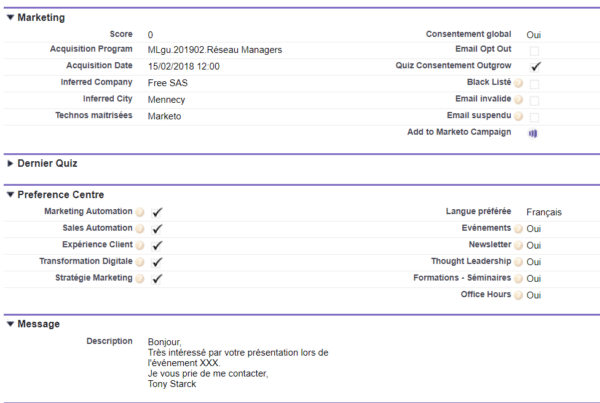
What can prevent the Marketo Salesforce integration from working
Marketo relies on native salesforce processes to operate.
Decision-making contacts must be attached to opportunities
For example, it will assume that sales manages their future revenue and signups across opportunities. And that they consistently show the people involved in the signing in that same opportunity object.
These two points are key for a correct reallocation of the revenue on the Marketo campaigns.
One owner per contact
Marketo will also assume that an owner exists for each contact (or at least for each account), which will allow Marketing to send campaigns on behalf of Sales.
But when there are several sales people attached to a single contact, how do you identify which one should lead the discussion?
There are ways to solve these situations but they will require some development on the Salesforce side.
A Lead object without constraints
One last thing: Marketo communicates with sales through the Lead object.
When a hot lead is detected on the Marketo side, it is sent to the salesforce side to be qualified, deduplicated, assigned to the correct salesperson and eventually converted.
So Marketo needs to be able to create a lead without too many constraints. If there are validation rules that prevent a lead from being created, this will be a problem.
OK, I’ll synchronize Marketo and Salesforce!
Once the Marketo Salesforce integration is in place, the two solutions will talk to each other every five minutes. The delay is configurable via support. And data created, updated, deleted or merged in the meantime will exchange without any action required on your part.
Marketing will be able to target leads, contacts, accounts, opportunities, sales teams, and all salesforce objects related to the contact or account.
Better yet, if you create a field or a new object after the fact, Marketo will suggest it the next time you sync !
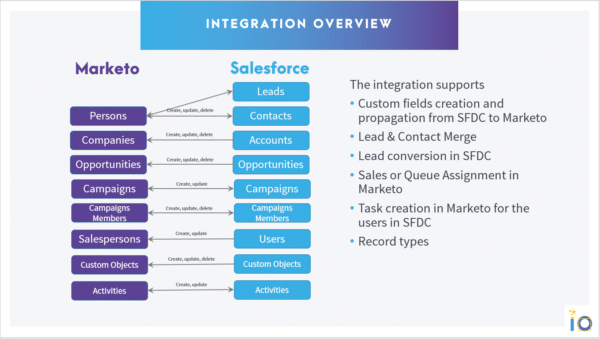
Overview Marketo Salesforce Integration
Obviously we will have defined beforehand the fields that Marketo can see and modify in salesforce and vice versa, so no risk of untimely overwriting of data.
Benefits for Marketing and Sales
I detail all the benefits of Marketo Salesforce integration in this video.
Benefits of Marketo Salesforce Integration
Marketing gets the fresh data from Sales so they can target better.
And Sales is not overloaded with data. They can only see what they have determined to be relevant, i.e. the hot leads. They will arrive with all the relevant information to get in touch
- for example, this lead downloaded a white paper,
- visited 12 pages of our site in 2 days – with the list of pages – and
- and registered for a webinar.
Marketing will also be able to synchronize their campaigns with Salesforce. This allows Sales to see all the actions that have affected leads and contacts. And with each time, the status indicating if it was a success or not.
The marketing team also has a number of possible actions to take in Salesforce:
- create tasks for sales,
- push the lead to Salesforce,
- convert it,
- change the owner,
- add it to a campaign.
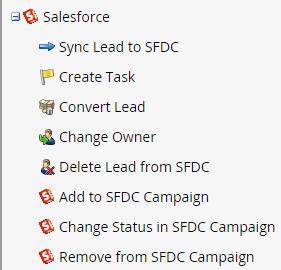
Sales can better engage customers
Sales will be able to send emails prepared by Marketing directly from the Marketo Sales Insight insert located on the contact page.
These will be tracked and the salesperson will be able to know if their contact has opened the email and clicked inside.
They will also be able to trigger certain campaigns made available by marketing
- For example, I come out of a meeting with a prospect and I detect that he could be seduced by our new product line.
- With one click, I insert him into a nurturing program created by marketing for this product line.
- Over the next few days, he will receive a series of emails on my behalf presenting the advantages of this product line.
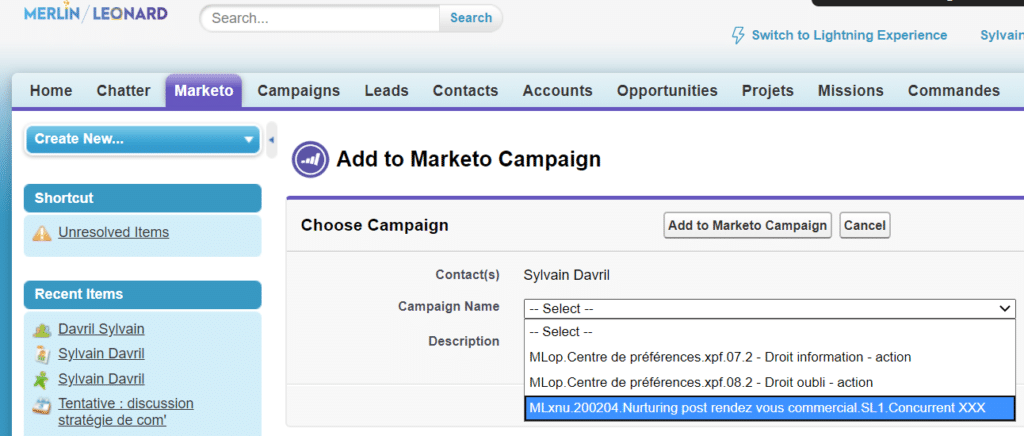
How do we help our clients with this issue?
We generally intervene in the following way for Marketo Salesforce integration
- We define with Marketing the perimeters of data to be exchanged
- From Salesforce to Marketo
- From Marketo to Salesforce
- We train the IT department on the integration, and perform the initial synchronization with them, often in a Sandbox environment
- Then, we verify that everything is in place by doing the necessary tests.
- Then, we support the IT department to carry out the synchronization in production.
- Finally, we build with marketing in Marketo
- the scoring program, which puts scores on all actions,
- and the lead life cycle program, which will automate the progression of new leads along the funnel thanks to the scoring. Then, when the threshold is reached, it will push the leads to Salesforce, and assign them.
Have a question? Need a hand? Merlin and Leonard are here to help.



